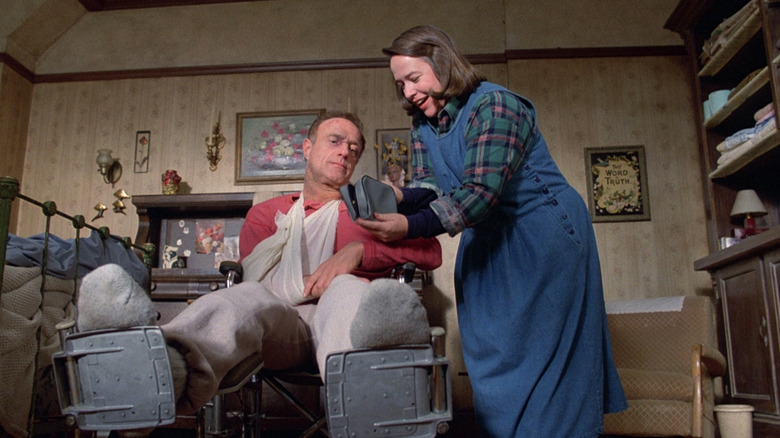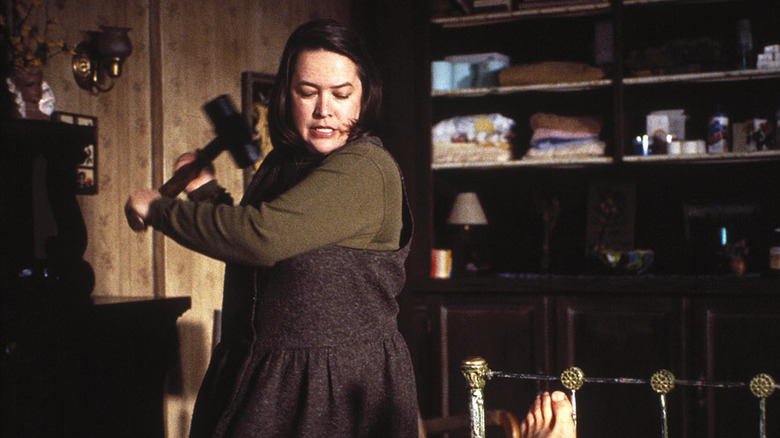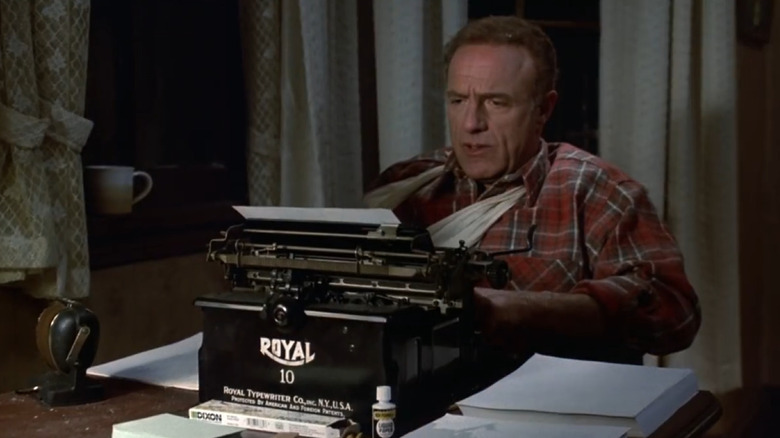How Misery Echoes Stephen King's Real Experiences
We may receive a commission on purchases made from links.
Over a decade before Stephen King was nearly killed when a car struck him, he wrote "Misery," a 400-page psychological thriller that starts with a well-known author named Paul Sheldon nearly dying in a car accident in the middle of a snowstorm. Luckily(?) Paul is rescued from dying alone in the cold by a lonely middle-aged woman named Annie Wilkes, who just so happens to be his number one fan. Most people know what happens next: Annie freaks out when she discovers Paul has killed off fan-favorite character Misery Chastain in his series' newest installment, and decides to hold him captive until he writes a sequel that brings Misery back to life. She also chops off his foot to make sure he can't escape, which is, honestly, just smart strategy. (In Rob Reiner's Oscar-winning film adaptation, she breaks his legs with a sledgehammer.)
Part of the inspiration for this book isn't too surprising: by the late 1980s, King had met his fair share of toxic fans. In a 1987 interview, King talked about several of his more unpleasant experiences with them. Not only does he believe he had a run-in with the man who shot John Lennon, but the entitlement of certain fans often led to a sudden shift from praise to vitriol:
"There was a guy begging for an autograph, but we were running super-late. 'I'm your biggest fan!' he said. 'I've read all your books!' I jumped in a car and he started saying, '—- you, you stupid son of a bitch.' The line is so thin between 'I love you' and 'I hate you.' They love you, but part of them wants to see you fall as far as you can."
Artists finding inspiration from the murky relationship between fans and creators is nothing new, and something that's only become more common now that the internet has made fan entitlement so much more public and harder to ignore. When looking at the frustration around George R. R. Martin's seeming inability to finish "The Winds of Winter," it's easy to see how fans can lose sight of the fact their favorite artists are people, not just machines designed to pump out content.
Responding to feeling typecast
In the beginning of "Misery," Paul is frustrated by the fact that his book series based around Misery Chastain — considered by critics to be trashy romance novels — are way more popular than his previous attempts to write serious, literary work. This is what motivates him to kill Misery off and write his more serious, more literary novel, titled "Fast Cars" — he wants to stop being defined by his romance novels and start being known as a serious writer.
King himself is less concerned about being seen as a serious writer; when an interviewer pointed out that he was often dismissed by the literary establishment early in his career, he responded, "I have outlived most of my most virulent critics. It gives me great pleasure." However, he did often feel typecast as a horror writer. Although he's responsible for many wonderful novels and short stories that aren't scary at all (we wouldn't have "The Shawshank Redemption" or "Stand By Me" without him), when readers see his name above the title, they tend to assume they're getting a horror story.
This was why one of his novels, the fantasy story "The Eyes of the Dragon," was received so negatively by fans at first. It was a light-hearted fairy tale story that wasn't traumatizing in the slightest, and fans considered it a bit of a letdown. Although the inner conflict Paul's dealing with doesn't match perfectly, it's easy to see how the expectations for King to stick to horror are mirrored by the expectations for Paul to stick to romance. It's just that the backlash Paul receives for trying to break out of readers' expectations is a little more intense than some bad reviews.
Stephen King wasn't just inspired by his frustrations as a typecast author when writing "Misery," however. The book was also in part about King's relationship to cocaine.
'Annie Wilkes is cocaine'
Stephen King's experience with addiction has always been a source of inspiration for his work, most notably in "The Shining," where Jack Torrance's alcoholism is a component of his descent into madness. King's been pretty open about his addiction to cocaine in particular, noting that he was "a heavy user" from 1978 until 1986. "'Misery' is a book about cocaine," he stated. "Annie Wilkes is cocaine."
He doesn't elaborate much on this, but it's not hard to guess what he means. Annie Wilkes is a destructive figure who causes Paul immense suffering on both a mental and physical level, and yet she also manages to get Paul to write what he himself considers one of the best books of his career. Paul is initially reluctant to write "Misery's Return," and is devastated when Annie forces him to burn his only copy of "Fast Cars." But by the end of the novel he's begrudgingly proud of what he's written. When he finally manages to outsmart Annie and successfully escape, he does so while keeping the safety of the manuscript a priority.
Some of the King's best novels — "It," "Christine," "The Dark Half" — were written in the middle of his spiraling addiction. King has admitted he doesn't even remember writing "Cujo," which is one of his most famous works. One of King's biggest fears was that quitting drugs would keep him from writing, and you can see that fear reflected in the way Annie is able to successfully push Paul to write one of the best novels of his career. For all her abusive behavior, she does turn Paul into a better writer.
In other words, the relationship between an artist and a substance can feel ... complicated. Especially for the artist.
A meditation on writing
"Misery" is a page-turner, but it's also filled with a lot of thoughtful meditations on writing. Although Paul never stops seeing Annie as his enemy, he does often find himself mulling over whether his initial distaste for his "trashy romance" novels was fair or not. The book is surprisingly critical of Paul's desire to be a "serious" writer, and contains a sort of deep dive into the writing process as Paul goes about his new draft of "Misery's Return." Paul initially tries to lazily bring Misery back to life with no consequences, but Annie forces him to make her resurrection feel honest and believable. Despite everything, the book make us feel that rush Paul feels when he finally figures out how to bring her back in a way that feels organic and respectful to the audience.
In his memoir "On Writing," King mentioned that Paul's character gave him the "chance to say some things about the redemptive power of writing that [he] had long felt but never articulated." Although originally forced to do so, it's through writing "Misery's Return" that Paul manages to regain his spirit that Annie had seemingly crushed. As Annie gets him addicted to painkillers and permanently takes away his ability to walk, its solely through writing that Paul is able to maintain his will to live.
Stephen King has never been particularly shy about basing his protagonists on himself — the main characters of "Salem's Lot," "The Shining," "It," "The Dark Half," "Desperation," and "Bag of Bones" are all writers as well — but "Misery" is perhaps the book that dives deepest into his writing process. As a result, "Misery" is not just one of the scariest and most consistently engaging books of King's career; it also feels like the most personal.



